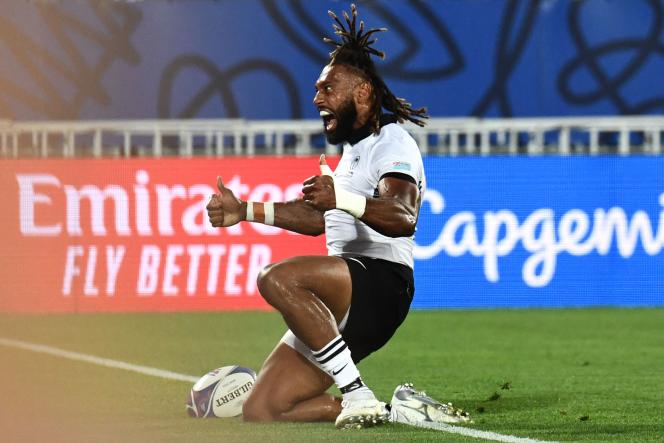Being a serious outsider in the Rugby World Cup and playing for survival from the second match of the group stage. This is the curious paradox of Fiji, beaten (32-26) by Wales when they entered the competition, Sunday September 10. Despite a comeback at the end of the match, Semi Radradra and his teammates were defeated while the Lyon center had the match ball in his hands, which he awkwardly dropped in the last seconds, a few meters from the goal. opposing goal.
As a result, the Flying Fijians find themselves obliged, or almost, to win against Australia, Sunday September 17, at the Geoffroy-Guichard stadium in Saint-Etienne. On paper, victory seems promised to the Wallabies, double world champions (who beat Georgia 35-15 for their debut in the competition), but the situation is not as obvious as the records of the two teams indicate .
Ranked seventh in the world before the start of the competition, Fiji were the highest ranked nation in Group C. A status acquired thanks to a few highlights, such as the first victory of their story against England, moreover at Twickenham (London), in August, during preparation for the World Cup (30-22).
This success can be partly explained by the loss of speed in English rugby. But not only. For several seasons, players from the Pacific have been progressing, led by stars who have cut their teeth in the best clubs in the world. Thus, coach Simon Raiwalui can rely on third-row Levani Botia, double European champion with Stade Rochelais, Toulon center Waisea Nayacalevu (French champion in 2015, with Stade français) or on the powerful winger of Racing 92 Josua Tuisova.
In the wake of the Fijian Drua
Among the 33 Fijians selected, there are also two players from Aviron Bayonnais, pillar Luke Tagi and center Sireli Maqala. “They are detonators, players capable of creating a scoring opportunity at any time. Sireli, for example, is phenomenal. He can beat any defender in a square meter », observes Gerard Fraser, back coach of the Basque club. Besides “the madness that they have always had” national team players, the New Zealand technician believes that the Fijians now have “a structure in the game”.
Yet “structure in the game” And “Fijians” rarely coexist in the same sentence. Even during qualification for the quarter-finals of the 2007 World Cup – already in France – the Flying Fijians stood out above all thanks to their offensive dazzlingness, and not really for their defensive rigor. But since then, things have changed, in the wake of the Fijian Drua.
You have 52.73% of this article left to read. The rest is reserved for subscribers.
